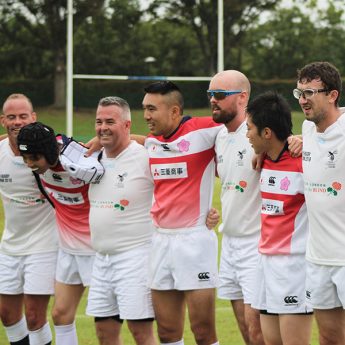Scots-Japan cricketer gonged for services to game
• About 3,000 cricket players in Japan
• Sponsors wanted to help promotion
The Scottish Parliament has recognised the contribution that Alex Miyaji, chief executive officer of the Japan Cricket Association, has made to the promotion of cricket in Japan. In addition, they proposed a match between Scotland and Japan to help the growth of the sport here, and cement ties between the two nations.
The Japan Cricket Association, set up in 1984 by a handful of expats and Japanese with knowledge of the game, was granted non-profit organisation (NPO) status in 2001.
When the motion was lodged in Edinburgh in late 2011 by Scottish Conservative and Unionist Party politician Alex Johnstone, Miyaji was on tour with the Japan national cricket team in the Independent State of Samoa.
“I really didn’t expect any sort of accolade like this”, Miyaji told BCCJ ACUMEN after returning from Samoa, where Japan finished a creditable third among the eight international teams that competed in the Pepsi ICC World Cricket League Division 8 tournament.
“It is a great honour and I am excited by the opportunities to further ties between Japan and Scotland.
“I would like to share this honour with all those who have been involved in growing the game in Japan”, he added. “Over the years, there have been a lot of people who have contributed in many ways and spent a lot of time promoting a sport that we all love. I’d like to take this opportunity to recognise those people.
“It is also an excellent opportunity to raise the awareness of the long-term challenges that the victims of the [2011 Tohoku] earthquake and tsunami are facing”, he said. “It will take many years to rebuild their lives and cities, but we will continue to do what we can to bring smiles to as many people as possible through Cricket For Smiles”.
The 34-year-old, who was born to a Scottish mother and Japanese father, fell for the sport during a summer holiday in the UK.
“I was born in Tokyo but we moved to Tochigi Prefecture when I was about two, so I grew up in the countryside”, he said. “When I was a child, I played baseball and football, just like any kid growing up in Japan. I don’t think I even knew what cricket was until I visited my aunt in Wimbledon for the summer when I was 10 years old”.
At a sports camp, he was introduced to the game that England gave to the world—and instantly fell in love.
“I could pitch a baseball and I’d been a pretty good fielder, so immediately I had a feel for the game, and loved it”, he said. Back in Tochigi, the young Miyaji revealed his new passion to his mother, who managed to get hold of a cricket bat and ball.
When weighing up his further education options, Miyaji noticed that Tokyo’s Keio University had a cricket team and so was sold on attending the institution.
“At that stage, it was more about having fun”, he explained. “There were not many coaches, the players were all of a similar level, but it was fun and I was pretty good”.
Miyaji, a medium-pace bowler who has opened the batting for Sano Cricket Club and at country level, was named in the Japan national team in 2000—his fourth year at university. Since his debut, Miyaji has played in 12 international tournaments on four continents. He hopes to complete the full set by playing in the Americas in the future.
The Scottish Parliament went further than simply recognising Miyaji for promoting cricket in Japan. It also praised his organisation for its Cricket For Smiles programme, established in the aftermath of the 2011 Great East Japan Earthquake.
“As an NPO, we had a social responsibility to do something when the disaster struck and I asked what cricket could do to help”, he said. “For us, it’s all about putting smiles back on people’s faces, getting people involved and competing. It’s healthy and fun”.
To introduce the children of Tohoku to a game with which they were completely unfamiliar, the programme replaced bowlers with a T-stand from which the batsmen could strike the ball.
“It’s all about giving everyone as much fun as possible and, at this stage, it’s not about knowing, for example, the leg-before-wicket rule”, he stressed. “It’s about opening up a whole new world to these children and then, if they want to, they can take the next step of joining a club and interact with people from other parts of the country.
“Ultimately, they can go on to represent their country and share the sport with people around the world”.
Today, there are an estimated 3,000 people who play cricket in Japan, with clubs particularly active at major universities.
The next step, Miyaji revealed, is to attract additional sponsorship to help take the sport to other areas of the country.
Recruitment firm Robert Walters is already a sponsor, and it is hoped that other British firms might be tempted to help—particularly given the English national team’s impressive performances in recent matches.






